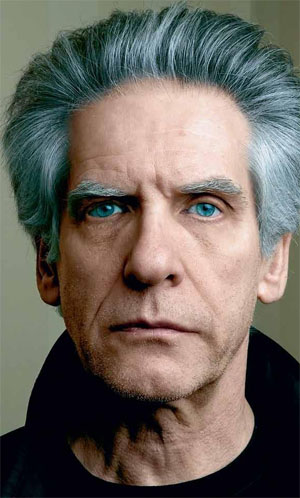David Paul Cronenberg turns 70 today, but we’re the ones getting the big birthday gift: He’s given 3sat an interview in which he looks back on his major features over the course of 90 minutes.
“He has made some of the best, most challenging, most unusual English-language films of the last 20 years,” wrote Jonathan Dee in a 2005 profile for the New York Times Magazine: “that kind of career may get you named a chevalier of the Order of Arts and Letters in France, but it also means that far from being personally enriched by his films, he still has to struggle as often as not to get them made at all.” At the time, Cronenberg had just made his 15th feature, A History of Violence, an adaptation of a graphic novel that he was hoping might score him a bit of clout, financial or otherwise. It wouldn’t be the first time. Dee: “After he spent a decade as a low-budget horror auteur, his 1983 adaptation of Stephen King’s Dead Zone for the schlock producer Dino de Laurentiis was presumed to herald his shameful surrender to the mainstream; 10 years later, fresh off his suitably demented adaptation of William Burroughs’s supposedly unfilmable novel Naked Lunch, Cronenberg described his next project—the film version of David Henry Hwang’s Broadway smash M. Butterfly, with a budget bloated enough to allow for location shooting at the Great Wall of China—as his ‘sellout movie.’ The thing is, both those movies turned out to be excellent, thoughtful works of art, entirely of a piece with his earlier films, and both, coincidentally or not, were considered box-office disappointments.”
Last August, writing for the Los Angeles Times, J. Hoberman noted that Cronenberg’s “first movies depicted futuristic dystopias, and most of his subsequent productions… have an alienated, science-fiction flavor. Cosmopolis, which gives the not unintentional impression of doggedly pushing the viewer 15 minutes into the future a few seconds at a time, makes the sci-fi element overt. Sound-proofed and screen-filled, Packer’s limousine space capsule has intimations of the moon shuttle in Stanley Kubrick’s 2001, even as the director’s visual strategies recall those from two other radical ’60s films, the discontinuous zoom of Michael Snow’s Wavelength and the lengthy traffic jam tracking shot in Jean-Luc Godard‘s Weekend. Indeed, Cronenberg is not only Kubrick’s heir as the most experimental narrative filmmaker at work today but the most provocative and consistently original North American director of his generation.”
Earlier in 2012, as A Dangerous Method made its way to the States from Venice, the Museum of the Moving Image launched a three-week Cronenberg retrospective, which in turn, sparked an invaluable series at Alt Screen, with extensive roundups on Stereo (1969) and Crimes of the Future (1970), The Brood (1979) and Videodrome (1983), The Fly (1986), Dead Ringers (1988), Crash (1997), eXistenZ (1999), and Spider (2002). And the highlight of the series was Nathan Lee‘s sharply argued defense of late Cronenberg:
To say that Cronenberg no longer makes horror movies is at once true and too obvious, predicated on an unimaginative reduction of the early films to their most conventional aspects…. Cronenberg’s crucial theme is the mechanics of signal processing: how information gets received, synthesized or rejected, and then output back into an external milieu. Scanners [1980], Videodrome, The Fly and eXistenZ take this up in a literal, almost electromagnetic sense. Naked Lunch diagrams a matrix of narcotic stimulation reacting on, and with, the creative flow. Calamitous erotic and reproductive signals structure his initial avant-garde experiments, Stereo and Crimes of the Future, and the venereal-horror cycle of his early exploitation films; variations and transformations of the theme underly The Fly, M. Butterfly, Dead Ringers, and Crash.
What’s unique about Cronenberg’s deployment of the idea is his almost total lack of interest in the origin of these impulses. Where they come from is irrelevant. What they consist of is unknowable. All that matters is how they enter and transform systems, their valences and effects, the things they inhibit or make possible. Experimental skin grafts don’t explain the events of Rabid [1997], only trigger them. Videodrome is a sustained enigma. Crash, with its radical emphasis on behavior over psychology, takes this ontological refusal to its extreme. That Cronenberg should take on psychoanalysis [in A Dangerous Method], the interpretive methodology par excellence, is less paradoxical than it seems given that the Freud/Jung relationship was tightly bound up in arguments over symptomatic teleology.
At around the same time, Moving Image Source posted Gina Telaroli‘s video essay on Dead Ringers, Physical Instincts, while the Los Angeles Review of Books ran Jonathan Penner‘s interview with the Canadian filmmaker.
Cronenberg is currently working on Map to the Stars, which the Playlist, reporting that Rachel Weisz will not be taking a role, notes “has Robert Pattinson and Viggo Mortensen slated to star in a Bruce Wagner, penned film that takes an acidic look at Hollywood.” And Cronenberg will be taking a role in front of the camera when Luca Guadagnino shoots Body Art, which, like Cosmopolis, is an adaptation of a Don DeLillo novel. His co-stars: Denis Levant and Isabelle Huppert.
In other news, the Nashville Scene‘s Jim Ridley talks with Sarah Finklea, who’s in charge of theatrical and television sales for Janus Films: “She just finished watching a recent Janus acquisition, David Cronenberg’s early horror masterpiece The Brood—she had to angle her laptop on a recent flight so it wouldn’t disturb the attendants.”
For news and tips throughout the day every day, follow @KeyframeDaily on Twitter and/or the RSS feed. Get Keyframe Daily in your inbox by signing in at fandor.com/daily.




